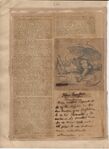< Remarkable Spiritual Manifestations in the House of the Rev. E. Phelps, D.D. (continued from page 7-235) >
among the early occurrences at Hydesville, Rochester, and Auburn.*
Sometimes these missives were enclosed in a book, and thrown down stairs or into the room; sometimes wrapped about a key or nail, or anything that would give a momentum, and thrown into the room. Often they were seen to fall from above; this occurring frequently when the doors were closed, and it was not possible for any visible agent to have been the cause. Writing would appear on the wall at times, made, as it appeared, with a pencil. On one occasion Dr. Phelps was writing at his desk, and, turning his back for a few moments, without leaving his chair, turned again to his paper, where he found written in large letters, “Very nice paper and very nice ink for the devil.” The ink was not yet dry, the desk was not two feet from him as he sat, and he was entirely alone in the room.
About the 1st of May, Dr. Phelps of Boston, brother of the Rev. Doctor and Professor Phelps, of Andover, a son of the Rev. Doctor, went to Stratford to “expose the humbug;” and with a full belief that it was a trick of evil-minded persons, and that they should be able to detect and expose it without trouble; and they were disappointed, as hundreds have been under like circumstances. On Tuesday evening a loud rap was heard on the back door, seeming to be made by the knocker, loud enough to be heard twenty rods distant. The servant went to the door, but no person was there. After the lapse of five or eight minutes the rap was repeated, It was then supposed that some one had done it mischievously, but on looking about no person was discovered. It was in the shades of evening, but not dark enough to prevent any person being seen who might have done it as easily as at midday. The knocking came the third time, when Dr. Phelps (the visitor) placed himself in the hall, perhaps four feet from the door, and the Professor, of Andover, took a position on the steps without, each having full view of the door. The same loud raps were repeated on the door between them. The knocker did not move, nor could the eye detect any cause for what met the ear. The noise was heard throughout the house, and both the gentlemen were positive that no visible agent was employed to produce it. About bed-time a loud pounding was heard on the chamber door. The gentlemen, each with a candle in hand, stood on either side of the door, as the pounding, as though done with a heavy boot, was continued. The noise appeared to each to be on the side of the door opposite to him. On the following morning, as Dr. Phelps, of Stratford, was standing at the foot of the stairs leading to the third storey, a noise as loud, and much resembling the report of a pistol, occurred apparently close to his ear. These boisterous sounds occurred at intervals during a great part of the time that the disturbance was continued. Sometimes for weeks they would be heard; and again for days they were heard every day.
It would seem, from various occurrences, that the agents of these sounds, whoever they were, must have been human beings, or at least possessed of all the leading characteristics of humanity. They were evidently influenced by kindness or unkindness, by respect and confidence, as persons generally are in this life. Some instances illustrating this are given. One morning, during the breakfast hour, they would push the breakfast table suddenly, raise up one side and shake it in such a manner as to spill the coffee, and otherwise occasion serious inconvenience. A person at the table spoke to them in a tone of authority, commanding them to desist; but the act was at once repeated. Again they were commanded to cease, but increased violence followed this demand. This was five or six times repeated, and the shaking was each time renewed. At length another person at the table said, “I request you kindly to cease this annoyance, and allow us to take our breakfast quietly,” and they ceased at once without a repetition. It was found from this time that kindness had about the same effect upon them that it produces upon mankind at large. A lady, the wife of a clergyman, spent a few weeks in the family during the summer, who received many communications from them, would often, when the scissors, thimble, or things of that kind were mislaid, say, “I will thank the spirits to return my thimble, scissors,” or whatever was missing, and the article missing would drop at her side, or in her lap, within a minute. Things of this kind occurred very many times in course of the time that these phenomena were continued. If a key or knife, or anything of the kind was mislaid, and any person was looking for it, frequently it would be thrown to them as though their wants were anticipated. Dr. Phelps was once with Harry in the stable, when the currycomb could not be found, and he asked Harry where it was, to which Harry replied that he did not know. At that moment the Doctor saw it rise, as if thrown, from a point ten feet distant from them, and, describing a parabola, fall within a short distance of the spot where they both were standing.
* Mr. Sunderland, in his Book of Human Nature, p. 280, says this was the first of the spirit-writing, but he is in error. The author of this work was acquainted with cases of this kind long before the disturbances at Stratford.
<... continues on page 7-263 >
Ideas Theosophical
...
Editor's notes

